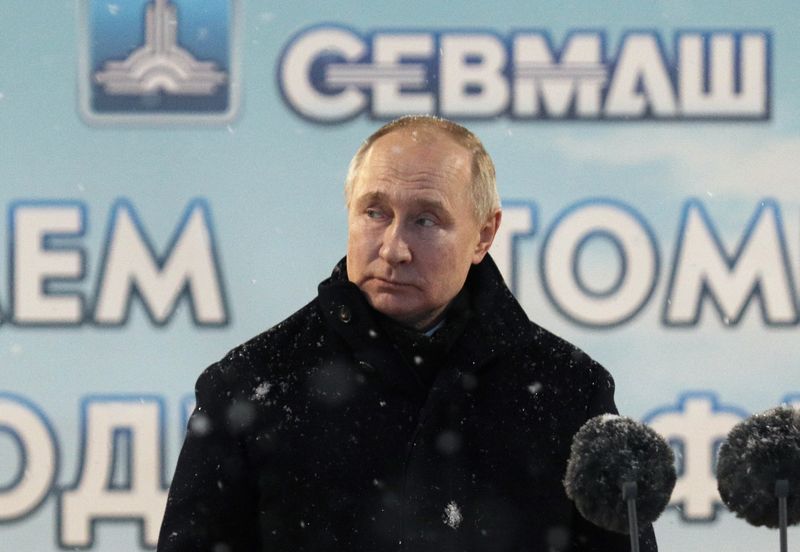By Mark Trevelyan
LONDON (Reuters) - The prospect of six more years in power for Russian President Vladimir Putin is likely to mean no let-up in nuclear tensions with the United States, as time runs out on the last remaining treaty that limits the number of warheads each side can deploy.
Putin has boasted since launching his 2022 invasion of Ukraine that Russia has the world's most advanced nuclear arms and said it could wipe out any aggressor.
On Monday, three days after announcing he would stand for re-election in March, he presided at a flag-raising ceremony for two new submarines including the Emperor Alexander III, which last month tested a nuclear-capable Bulava intercontinental ballistic missile.
While denying that Moscow is "brandishing" nuclear weapons and resisting calls to adopt a more aggressive doctrine on their possible use, he has placed his nuclear forces on raised alert and announced the deployment of tactical nuclear missiles in Belarus, his neighbour and ally.
Last month he signed a law revoking Russia's ratification of the global treaty that bans nuclear testing, although Moscow says it will not carry out a test - which would be its first since the 1991 collapse of the Soviet Union - unless the United States does so.
Some security analysts say nuclear weapons have assumed greater importance in Putin's thinking and rhetoric as his conventional forces have struggled in Ukraine and as Western countries have weaned themselves off Russian energy, weakening his ability to exert pressure by cutting off oil and gas.
The Kremlin leader has no interest in talking to Washington about reducing nuclear risk, analysts say, because Moscow believes it is precisely the fear that it may resort to nuclear weapons that has deterred the United States and its allies from directly joining the war on Ukraine's side.
"How can you reduce the risk if you continue to play the nuclear card vis-a-vis the United States and NATO?" said former Soviet and Russian diplomat Nikolai Sokov, a senior fellow at the Vienna Center for Disarmament and Non-Proliferation.
"How can you discuss something to make sure that nuclear weapons are never, ever actually used if you want to keep the threat - maybe not really high but at least at some kind of visible and credible level?"
TICKING CLOCK
By the time Putin's expected new term gets under way next May, there will be less than two years remaining until the New START treaty, which limits Russia and the United States to 1,550 strategic nuclear warheads and bombs on each side, expires on Feb. 4, 2026.
The agreement, originally due to run out in 2021, was hurriedly extended for five years after U.S. President Joe Biden was inaugurated at the start of that year.
But the prospects for a further extension, let alone a more ambitious successor pact, look doubtful for many reasons. China's nuclear build-up is a complicating factor, and it's not clear who will be in charge in the White House by 2026.
Putin this year suspended Russia's participation in New START, and Deputy Foreign Minister Sergei Ryabkov said last month that Moscow would not resume dialogue unless the United States dropped what he called its "fundamentally hostile course" towards Russia - a reference to U.S. backing for Ukraine which Biden has said is unshakeable.
Putin has frequently talked up the potential of Russia's new weapons systems such as the Sarmat intercontinental ballistic missile and Burevestnik cruise missile, and Ryabkov said Washington was wrong if it thought it could win a news arms race against Russia of the kind that U.S. President Ronald Reagan conducted in the 1980s.
But such a contest would impose strains on Russia too.
"Russia knows that an uncontrolled new nuclear arms race is something they would not be able to afford and do not really have the capacity to sustain. Even more so now that in most respects Russia is much weaker as a consequence of its war against Ukraine," said Nigel Gould-Davies of the International Institute for Strategic Studies in London.
He said sanctions, while they had not crippled Russia's economy, were restricting its access to technology, citing the crash of its moon-landing mission in August as an example of a spectacular high-tech failure.
Sokov, the former Russian diplomat, expressed a different view, saying Russia's research and development programmes were far cheaper to run than those of the United States, and that Russia's economy was in better shape than the Soviet Union's in the 1980s.

"We are heading into a new arms race anyway, actually. It will not be a quantitative arms race in terms of changing numbers, it will be an arms race about the quality of weapons and new types and new capabilities," he said.
"We will be living in a situation that is less stable and the prospects of arms control are quite bleak."